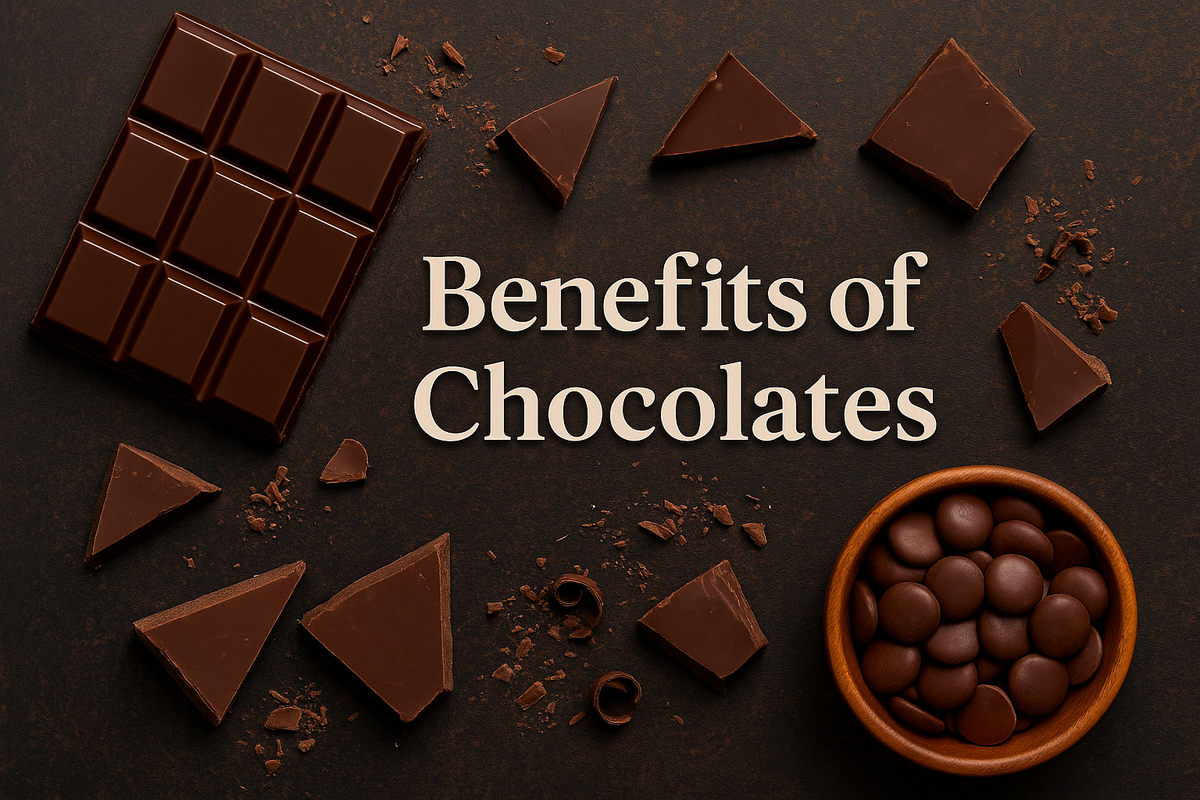Benefits of Chocolates 🍫 | Why Chocolate Is More Than Just a Treat

Chocolate is more than just a delicious dessert or an indulgent snack. In fact, science is increasingly showing us that this sweet treat, especially in its darker forms, comes with a wide range of health benefits. From boosting brain function 🧠 to improving heart health ❤️ and even uplifting your mood 😄, chocolate—when consumed in moderation—can be a part of a healthy lifestyle.
In this comprehensive guide, we’ll explore the many benefits of chocolates, with a special focus on Sugar-Free Dark Chocolate and how it can be a smart and healthy choice, especially for people concerned about sugar intake.
1. Chocolate and Heart Health ❤️
One of the most well-documented benefits of chocolate—particularly dark chocolate—is its ability to support cardiovascular health. Rich in antioxidants called flavonoids, dark chocolate helps reduce blood pressure, improve blood flow, and lower the risk of heart disease.
- 🍫 Improves blood circulation
- 💓 Reduces “bad” LDL cholesterol
- 🧬 Increases “good” HDL cholesterol
- 💉 May reduce the risk of stroke
Flavonoids work by relaxing blood vessels and reducing inflammation, which helps lower blood pressure. Just a small square of dark chocolate a few times a week may contribute to a healthier heart.
2. Boosts Brain Power 🧠
Yes, chocolate can make you smarter! Studies suggest that consuming chocolate—especially dark chocolate—can enhance cognitive function. The flavonoids in chocolate increase blood flow to the brain, which may improve memory, attention span, and reaction time.
In fact, research has linked chocolate consumption to a reduced risk of neurodegenerative diseases like Alzheimer’s and Parkinson’s. Next time you need a mental boost, reach for a piece of dark chocolate instead of another cup of coffee.
3. Mood Enhancer & Stress Reducer 😄
Ever notice how chocolate can instantly lift your mood? That’s because it stimulates the production of endorphins—your brain’s natural “feel-good” chemicals. Chocolate also contains serotonin, a neurotransmitter that promotes well-being and happiness.
Eating chocolate in moderation has been shown to reduce levels of stress and anxiety. It’s a natural way to give yourself a little pick-me-up during a tough day.
- 😊 Elevates mood
- 🧘♂️ Reduces stress and anxiety
- 🧡 Boosts emotional well-being
4. Great for Skin (Yes, Really!) ✨
Contrary to the old myth that chocolate causes acne, studies now suggest that the antioxidants in dark chocolate can actually benefit your skin. These antioxidants protect your skin from UV rays and improve blood flow, giving you a healthy, radiant glow.
However, it’s important to avoid chocolates with high sugar content as they can counteract these benefits. That’s where sugar-free dark chocolate comes in as the perfect alternative.
5. Rich Source of Antioxidants 🛡️
Chocolate—especially high-quality dark chocolate—is loaded with antioxidants. In fact, it often contains more antioxidants than blueberries and acai berries. These powerful compounds help combat oxidative stress and protect your cells from damage caused by free radicals.
Some of the antioxidants found in chocolate include:
- Polyphenols
- Flavanols
- Catechins
Regular intake of these antioxidants can help reduce inflammation and lower the risk of chronic diseases like cancer and diabetes.
6. Supports Weight Loss (When Chosen Wisely) ⚖️
Believe it or not, chocolate can be a part of a weight loss plan. The key is moderation and the type of chocolate you choose. Sugar-free dark chocolate is a great option for those who want to enjoy the benefits without the extra calories and sugar.
Dark chocolate helps curb cravings by promoting feelings of fullness. It can also regulate insulin levels, which is important for maintaining a healthy weight.
Try having a small piece of dark chocolate before or after meals to reduce appetite and enhance satisfaction.
7. Good for Diabetics (Sugar-Free Options) 💉
Many people with diabetes avoid chocolate due to its high sugar content. But today, there are several sugar-free chocolate options that taste great and are diabetic-friendly.
Sugar-free dark chocolate is low on the glycemic index and doesn't spike blood sugar levels. It’s also rich in flavonoids that support insulin sensitivity and overall metabolic health.
So if you’re managing diabetes, you don’t have to give up on chocolate—just choose the right kind!
8. A Natural Aphrodisiac 💘
Chocolate has long been associated with romance, and for good reason. It contains compounds like phenylethylamine (PEA) which mimic the feeling of being in love. Chocolate enhances mood, increases attraction, and can boost libido.
That’s why it’s a favorite gift on Valentine’s Day and anniversaries. Sharing a piece of rich, dark chocolate can spark joy and connection between partners.
9. Enhances Athletic Performance 🏃♂️
Surprisingly, chocolate can even benefit your workouts! The epicatechin in dark chocolate helps widen blood vessels, improving oxygen delivery to your muscles. This means more stamina and quicker recovery after intense exercise.
Some athletes use a small piece of dark chocolate as a pre-workout snack to fuel performance and enhance endurance.
10. May Improve Gut Health 🦠
Your gut loves chocolate! The prebiotics found in cocoa can help stimulate the growth of healthy bacteria in your digestive tract. A healthy gut is linked to improved immunity, better mood, and even clearer skin.
Incorporating moderate amounts of high-quality chocolate into your diet can contribute to a healthier gut microbiome.
How to Choose the Best Chocolate 🍫
Not all chocolates are created equal. Here’s what to look for when choosing a healthy option:
- ✅ Go for at least 70% cocoa content
- ✅ Choose sugar-free chocolate or ones with natural sweeteners like stevia or erythritol
- ✅ Avoid artificial ingredients and trans fats
- ✅ Choose ethically-sourced, organic varieties when possible
Remember, moderation is key. Even the healthiest chocolate should be enjoyed in sensible portions.
Conclusion: Chocolate Is More Than Just a Sweet Treat 🎉
Chocolate—especially dark chocolate and sugar-free options—is full of surprising health benefits. From heart health and mental clarity to glowing skin and improved mood, this ancient treat deserves a place in your wellness routine.
So go ahead—savor that square of rich dark chocolate. Your body (and your taste buds) will thank you. 🍫✨

Q: What type of chocolate is best for health benefits?
A: Dark chocolate with at least 70% cocoa content is typically the best choice for health benefits due to its high flavonoid content.
Q: Can chocolate really improve your mood?
A: Yes, chocolate contains compounds like serotonin and phenylethylamine that can boost mood and increase feelings of happiness.
Q: Is it okay to eat chocolate every day?
A: It's important to consume chocolate in moderation due to its high calorie and sugar content. Eating a small amount of dark chocolate every day may provide health benefits without leading to weight gain.
Q: Does chocolate cause acne?
A: There is no clear evidence to suggest that chocolate causes acne. However, consuming excessive amounts of chocolate and other high-sugar foods may contribute to acne development in some people.
Q: Can chocolate reduce the risk of heart disease?
A: Some studies have suggested that consuming moderate amounts of dark chocolate may help lower the risk of heart disease by improving blood flow and reducing inflammation.
Q: Is chocolate a good source of antioxidants?
A: Yes, chocolate contains antioxidants such as flavonoids and polyphenols that have been shown to have numerous health benefits.
Q: What are the benefits of eating chocolate?
A: Chocolate contains compounds called flavonoids which have antioxidant properties and may have cardiovascular benefits. It also contains caffeine which can improve alertness and mood.
Q: Does chocolate have any negative health effects?
A: Chocolate is high in calories, sugar, and fat, so it should be consumed in moderation as part of a balanced diet. Eating too much chocolate can lead to weight gain and an increased risk of dental caries.
Q: Is there any difference between milk chocolate and dark chocolate in terms of health benefits?
A: Yes, dark chocolate with a high percentage of cocoa (at least 70%) has more flavonoids and less sugar than milk chocolate, so it is generally considered the healthier option. Milk chocolate may still contain some health benefits, but it is typically higher in sugar and fat.
Q: Is it safe to consume chocolate during pregnancy?
A: Yes, it is safe to consume moderate amounts of chocolate during pregnancy. However, pregnant women should avoid consuming excessive amounts of caffeine, which is present in chocolate.
Q: Can eating chocolate help lower blood pressure?
A: Some studies suggest that the flavonoids in chocolate may help to lower blood pressure. However, more research is needed to confirm these findings and to determine the optimal amount of chocolate that should be consumed to achieve these benefits.
Q: Is it true that chocolate can improve brain function?
A: Some studies suggest that the flavonoids in chocolate may have cognitive benefits, such as improving memory and cognitive function. However, more research is needed to confirm these findings and to determine the optimal amount of chocolate that should be consumed to achieve these benefits.





